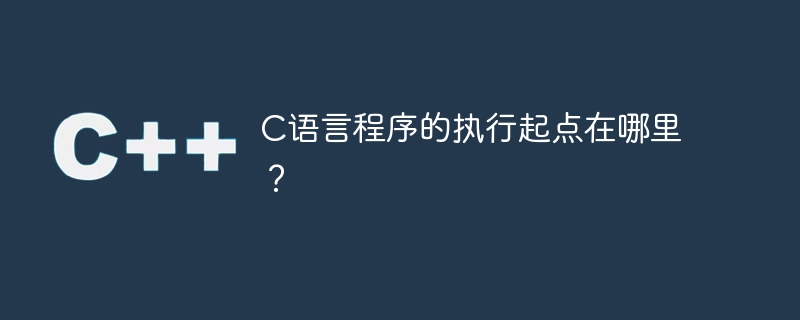Home >Backend Development >C++ >What is the starting point of a C program?
What is the starting point of a C program?
- WBOYWBOYWBOYWBOYWBOYWBOYWBOYWBOYWBOYWBOYWBOYWBOYWBOriginal
- 2024-02-19 16:48:071452browse

Where is the starting point for execution of a C language program?
As a high-level programming language, C language is widely used in various fields and has become one of the necessary skills for programmers. When writing a C language program, we need to clarify the execution starting point of the program, that is, where the program starts execution. So, where is the starting point of C language program execution? This article will give you an in-depth understanding of the starting point of C language program execution.
The execution starting point of a C language program is the main function. In C language, every executable program must contain a main function, which is the entry point of the C program. When the program is running, the operating system will find the main function in the program and start execution from that function.
The definition format of the main function is as follows:
int main()
{
// 程序的主体部分
return 0;
}The main function is a special function, and its return type must be int type. The int type is an integer type, used to represent the status code returned by the main function. In the main function, we can write the main part of the program, which is the actual code logic to be executed.
The main function has two common forms: the parameterized form and the parameterless form.
The main function without parameters is defined as follows:
int main()
{
// 程序的主体部分
return 0;
}The main function with parameters is defined as follows:
int main(int argc, char *argv[])
{
// 程序的主体部分
return 0;
}The main function with parameters starts when the program starts , you can receive command line parameters. The argc parameter represents the number of command line parameters, and the argv parameter is an array of character pointers, each element pointing to a string of command line parameters.
Before the main function, we can define other functions in the program, and these functions can be called in the main function to implement the functions of the program. But no matter what, the program will always start execution from the main function.
In order to better understand the starting point of C language program execution, we can look at a simple example program:
#include <stdio.h>
void printHello()
{
printf("Hello, World!
");
}
int main()
{
printHello();
return 0;
}In this program, we define a function named printHello for Print "Hello, World!". In the main function, call the printHello function to perform the printing operation. When the program starts, the operating system will find the main function and start execution. During the execution process, when the call statement of the printHello function is encountered, it will jump to the definition of the printHello function for execution and print "Hello, World!". Then return to the main function to continue execution, and finally return 0 to indicate that the program ends normally.
To sum up, the starting point for execution of a C language program is the main function, whether it is the main function without parameters or with parameters. In the main function, we can write the main part of the program and call other defined functions to achieve the required functions. Through these basic knowledge, we can better understand the execution process of C language programs and lay the foundation for further learning and development of C language programs.
The above is the detailed content of What is the starting point of a C program?. For more information, please follow other related articles on the PHP Chinese website!

